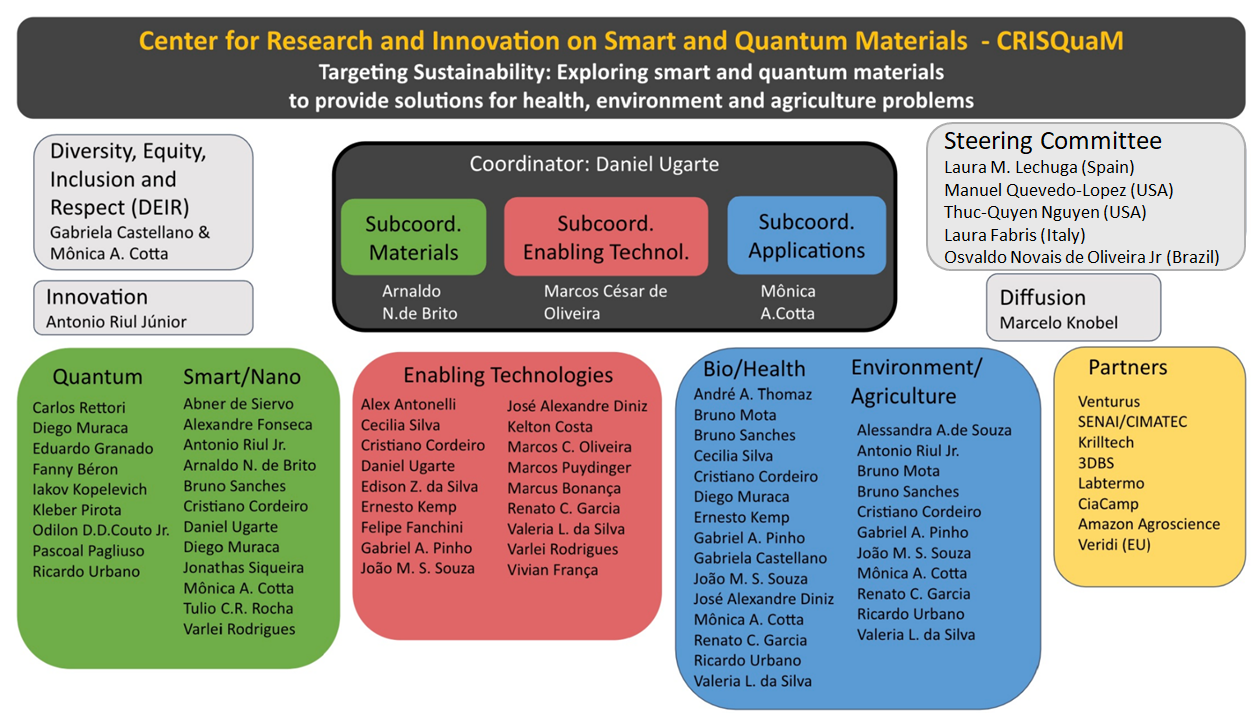BV-FAPESP: research projects supported in this Center
CRISQuaM in the Media: news about the center
CRISQuaM aims to explore the synergistic development of fundamental and applied science to create new materials with high potential for the construction of devices and sensors to address technological challenges related to sustainability, climate change, precision agriculture, ecology, and health. To achieve these goals, we have assembled an interdisciplinary and collaborative research team, integrating expertise across various scientific domains, researching novel materials with high innovation potential. By combining original synthesis methods, advanced characterization techniques, theoretical approaches, computational simulations, quantum technologies, and device construction designs, we aim to drive advances in smart and quantum materials, promoting scientific excellence and technological development. With this, we plan disruptive innovations in instrumentation—including hardware and AI-based tools—as well as in quantum technologies, biomedical devices, and signal processing, in addition to plant bionics, exploring plant-pathogen interactions. Besides research activities, we plan intensive actions in education, dissemination, and communication for the general public, as a modern society should be aware of the challenges humanity faces and how research and technology are essential for responsibly utilizing the planet's limited resources. CRISQuaM's Innovation activities are accelerated through partnerships with several companies in related technologies, many of them Brazilian. Finally, all activities of the Center are managed in accordance with diversity, equity, and inclusion goals and best practices.
The Center brings together scientists, engineers, and innovators in a collaborative effort to apply materials science and quantum technologies at the cutting edge, designing new materials and nano(bio)sensors for advanced diagnostics. The Center has a team capable of producing a wide range of (nano/micro) materials, along with precise chemical and physical characterizations using modern techniques (synchrotron, advanced microscopy, magnetotransport, magnetic resonance, optics, etc.). In addition, the team offers various options in enabling technologies, including miniaturization, processing, and additive manufacturing, as well as instrumentation, quantum sensing, and electronics development. Data analysis will employ updated approaches (numerical simulation, classical and quantum machine learning, and quantum optimization). Applications at the knowledge frontier will address urgent sustainability needs in environmental areas, precision agriculture, plant bionics, and biomedical interfaces, contributing to the development of local technologies in close partnership with the Brazilian industry.
The organization of the Center is based on three pillars — Materials, Enabling Technologies, and Applications — together with partner companies, as described in the figure below.

2024-11-20
Researchers at the University of São Paulo found 62 proteins specific to spores of Aspergillus fumigatus, a fungal species that causes lung disease. The study, published in Nature Microbiology, showed that at least one of these proteins inhibits human defense mechanisms.
2024-11-18
An analysis of 429 specimens belonging to 39 species representative of the diversity of Polistes in the Americas confirmed the inverse of Bergmann’s rule by pointing to larger body size for species occurring in or near the tropics compared with species inhabiting higher latitudes.
2024-11-13
Researchers partnering with the City of Guarujá (São Paulo state) conducted a study that found a high level of contamination on Perequê Beach, with plastics and cigarette butts predominating. The results will be useful for policymakers to implement measures that can mitigate the problem.
2024-11-13
This particular strain of Klebsiella pneumoniae had previously been detected in the United States. The bacterium frequently causes infections in hospitals, is not eliminated by any existing antibiotic, and is especially dangerous for people with low immunity.
2024-11-13
The inventory identified some 1,000 landslide points in São Sebastião (São Paulo state, Brazil). The research group is now using airborne laser scanning and other data inputs to create a methodology capable of more precise results.
2024-11-13
The fuel produced at the experimental station will power three city buses that will circulate around the university campus, as well as a bus that can drive 450 Km on a to and fro travel between São Paulo and Piracicaba.